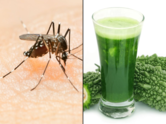01/7Think you have a common cold? Signs that tell you otherwise

It's almost November end and many, besides enjoying the winter breeze, are getting affected by the viruses lurking around. Runny nose, sore throat, congestion, sneezing and cough are some of the symptoms taking a toll on people's health. As long as it is a common cold, it is likely to get cured on its own in just three to four days. However, if it's something more serious, one should take proper care and caution. But how do you know if it's just cold or something more serious that needs medical attention? Here are some questions to ask yourself...
Also read: Measles is an imminent threat worldwide due to pandemic, WHO report finds
02/7How high or persistent is your fever?


With a common cold, you usually don't get a fever with a cold. Sometimes, adults and kids can experience a low-grade fever between 99.5° F and 100.3° F. But, if you experience a gradual rise in your body temperature, a fever that is at or above 101 degrees, it may be a sign of COVID, the flu, a bacterial infection or a strep throat. Call your healthcare provider if your temperature is 103 F (39.4 C) or higher.
Also read: What does a heart attack feel like? Survivors share symptoms, key points to know
03/7Are you experiencing chest pain and shortness of breath?


Having a cough is indicative of a common cold. But if it is severe, accompanied with shortness of breath, difficulty in breathing, wheezing or chest pain, it can be something more serious like a bronchitis or pneumonia.
Earlier in the COVID-19 pandemic, the SARs-CoV-2 virus could also cause an infection of the lower respiratory tract, affecting the lungs and leading to severe respiratory complications. However, with the emergence of the Omicron - a more milder version of the virus - severe COVID symptoms are less likely.
04/7Any localized pain?


Common cold viruses affect the entire upper respiratory system i.e. the nose or nostrils, nasal cavity, mouth, throat (pharynx), and voice box (larynx). That said, if you experience symptoms just in a single, or a particular location, it may mean something other than a common cold.
For instance, if you feel severe discomfort in just your throat, it could indicate a strep throat, or if you experience headaches or your teeth hurt, then it could mean a sinus infection. These localized symptoms could tell you whether you have a common cold or something else.
05/7Do you have gastrointestinal issues?


Stomach issues are not that common with a common cold. So, if you experience nausea, loss of appetite, diarrhea or vomiting, it could be something more serious like a flu. Apart from cold-like symptoms, digestive ailments are common with the influenza and the COVID virus.
06/7Other illnesses that can start with cold-like symptoms


While not dangerous, a common cold virus can weaken your immune system and make it more prone to other serious infections. For instance:
Bronchitis - There is a chance that acute bronchitis may come after a common cold or other viral respiratory infections. It is a condition wherein excessive mucus builds up in the lungs and airways.
Strep throat - A persistent and untreated common cold infection can sometimes lead to a strep throat, which is more severe and painful. Its symptoms include pain with swallowing, fever and swollen neck lymph nodes.
Sinus infection - When you have a common cold, the virus can infect and inflame the sinuses and the sinus membrane. The condition is also known as viral sinusitis.
Pneumonia - Some of the viruses that cause colds and the flu can cause pneumonia. Pneumonia is a severe lung infection that occurs when there is fluid-formation in the lungs’ air sacs.
07/7How to protect yourself?


Most respiratory infections are contagious, which is why wearing masks, maintaining distance, and following proper hand hygiene is crucial.
One must also eat immunity-boosting foods and strengthen their body with regular exercises. Include fibre-rich foods in your diet, so as to improve your digestive health, which is said to be associated with a healthy immune system.























































































closecomments
SIGN IN WITH
FacebookGoogleEmail